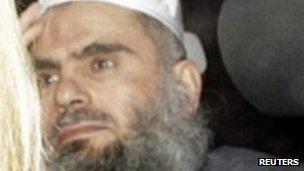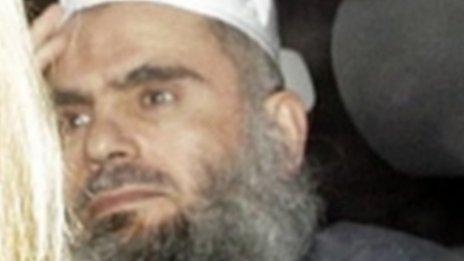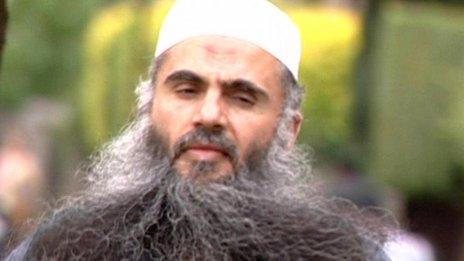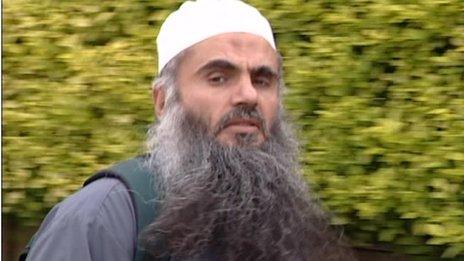Abu Qatada case: Jordan talks positive - Theresa May
- Published
The BBC's Gordon Corera says the "clock is ticking" for the Home Secretary, before Abu Qatada's bail conditions are relaxed
Talks in Jordan over the deportation of Abu Qatada have been "positive", Home Secretary Theresa May has said.
But she is seeking further assurances no evidence obtained via torture will be used against the radical cleric, who faces terror charges in Jordan.
A UK judge ended Abu Qatada's six-year detention after the European Court of Human Rights (ECHR) blocked his deportation to the country last month.
The 51-year-old was released from jail on strict bail conditions, external.
They impose on him a 22-hour curfew, allowing him to leave home for a maximum of an hour, twice a day.
Mrs May began talks with senior Jordanian officials on Monday and is expected to remain in the country until Wednesday.
She said Jordan had made "significant human rights advances" but that they had not been recognised by the European court and that the two countries would continue to work together.
'Under pressure'
"Talks today have been positive but we have more work to do in getting the kind of assurances that will allow us to deport Qatada once and for all," she said.
"This case has gone on for over a decade and I want to bring it to a satisfactory end soon."
Ken Clarke said no British court would deport anyone who faced torture, or a trial based on evidence based on torture, as he called for the Jordanians to give "credible assurances" over Abu Qatada
Ayman Odeh, the Jordanian legislative affairs minister, has said his country passed a constitutional amendment in September to ban the use of evidence obtained through torture.
BBC security correspondent Gordon Corera said there was a lot of pressure on Mrs May to forge a deal with the Jordanian authorities.
Conservative MP Peter Bone, who has led calls for Abu Qatada to be sent back, predicted he would be deported shortly, saying: "There is no issue on this - he should go."
However, Justice Secretary Ken Clarke said: "No British court would deport anybody who was going to be tortured or face trial based on torture."
'Credible assurances'
He said the Jordanians needed to give "credible assurances so he [Qatada] can go back".
This would mean a human rights lawyer in Strasbourg or the UK being convinced that the assurances were real, he said.
"It will be very disappointing if the Jordanians will not agree that they won't use evidence that was obtained by torture," he told the BBC.

Abu Qatada has fought a long battle against his removal from the UK
If the UK government fails to show any significant progress in talks on his deportation, Abu Qatada's bail conditions will be lifted after three months.
He has never been charged with any offence in the UK but ministers have described him as "extremely dangerous".
UK authorities have previously said he had given advice to those who aimed "to engage in terrorist attacks, including suicide bombings".
The cleric was released from Long Lartin high-security jail in Worcestershire, on 13 February.
He applied for bail when ECHR judges ruled he could not be deported without assurances from Jordan that evidence gained through torture would not be used against him.
Sending Abu Qatada back without such assurances would be a "flagrant denial of justice," the ECHR ruled.
The Special Immigration Appeals Commission then ruled that he should be bailed under strict conditions.
Abu Qatada was convicted in his absence in Jordan of alleged involvement in a plot to target Americans and Israeli tourists during the country's millennium celebrations.
However, should he return to the country, he will be retried on the same charges.
- Published14 February 2012

- Published15 February 2012
- Published26 June 2014

- Published4 March 2012

- Published9 May 2012

- Published23 February 2012

- Published16 February 2012

- Published13 February 2012
- Published14 February 2012